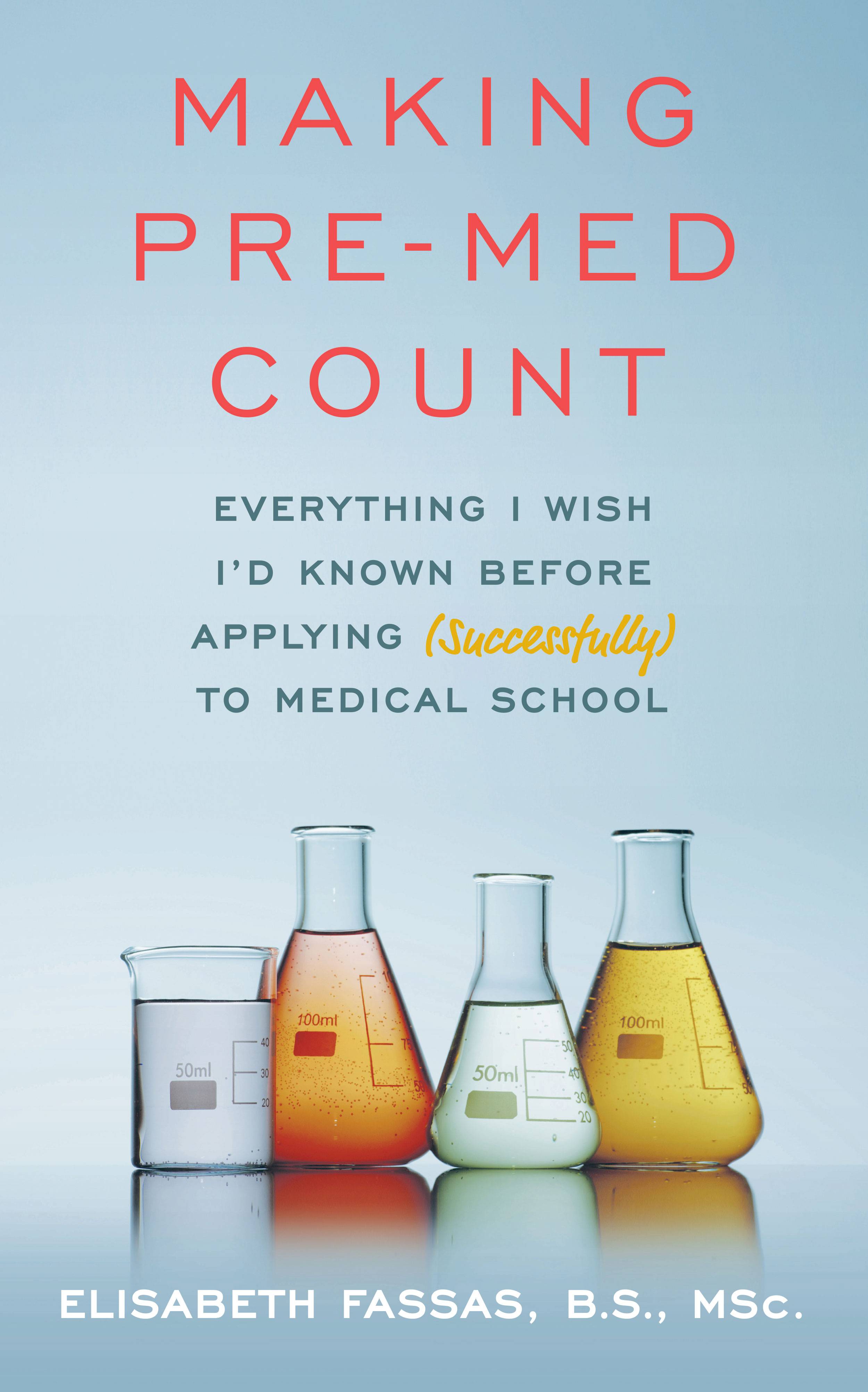
If you’re considering medical school, you probably have a million questions—what should you major in? How intensive is the workload? And how scary is the MCAT, really? Current University of Maryland School of Medicine student Elisabeth Fassas shares all her insight in her new book Making Pre-med Count: Everything I Wish I'd Known Before Applying (Successfully) to Medical School. Her personal stories and experiences offer guidance to the application process for other students on the pre-med path. Elisabeth believes that “anything and everything can get you into medical school if you’re able to get into the heads of the admissions committee.”
Going to medical school (and writing a book!) has kept Elisabeth pretty busy, but she took time to answer some of the most frequently asked questions prospective medical students may have, just for CollegeXpress. Learn more about her journey and get a feel for what med school is really like below.
Choosing medical school
Q: Why did you choose to go to med school?
A: Medical school was always “the plan” for me, although I definitely did a lot of soul searching before finally getting started. I explored a lot of different things in college—everything from International Studies to Anthropology—but always had medical school in the back of my head. As I progressed further through college and then a master’s degree, I realized that I am interested in health care more broadly: administration, policy, pharmaceuticals. All of that really has medical school as its foundation.
Searching for your program
Q: How did you find the right program for you?
A: When it came time to apply, and then ultimately to make choices on where to interview and attend, I was focused on three main things, which I also discuss in Making Pre-Med Count: academic day-to-day, broader values and performance, and geography. For me, that came down to selecting a school that gave us lots of free time for self-learning and for the pursuit of other passions, being in an urban environment within a school that was committed to engaging with its surrounding community, and staying reasonably close to my family and support system.
Related: Choosing the Right Graduate Degree for Your Goals
Understanding graduate school differences
Q: How does med school compare to your undergraduate experience (academically, mentally, etc.)?
A: I'm still early in my medical school career, but I would say that the way we are being asked to take in information is quite different from what I experienced in my undergraduate degree. There is a more memorization in medical school, which can be challenging at times. However, being in medical school means all of this information has practical implications for how you’re going to take care of your patients down the road! Keeping that in mind has been a lifesaver for me as I slough through seemingly endless material.
Finding the right undergraduate major
Q: What did you major in during undergrad? Do you think that prepared you well for medical school, and is there any particular major or area that’s “best” for prospective med school students?
A: I majored in Molecular and Cellular Biology in undergrad and did a minor in Social Policy. I felt so well prepared for medical school that during our second block when we did Genetics, I reached out to three of my old professors and advisors thanking them for teaching me so well and diving into the material so thoroughly, as it was definitely a more relaxed block for me. That being said, there is definitely not one major that medical school admission committees are looking for (in fact, none of the professionals I spoke to even listed “academic major” as one of the things they looked at in an applicant). The “best” major is really whatever you are most interested in and passionate about. You will be dedicating up to four years of your life focused on this one subject, and how interested you are will show up in your academic performance and in the recommendation letters that your professors will write.
Related: How to Pick a Major for Med School
Taking medical school entrance exams
Q: What was taking the MCAT like? How often did you study, and how did it compare to other standardized tests you have taken?
A: The MCAT is an absolute monster of an exam. For most students it will be, as it was for me, the first time they will be asked to master such a wide breadth of material while maintaining such an in-depth understanding of it. The process of preparing for the exam will be really personal to each student, and I always recommend to students that they don’t “rock the boat” in terms of study skills: clearly the way you study works—it has gotten you this far! For me, that meant understanding that I am a “marathon studier.” I can study for eight to 10 hours a day, but if there is anything else scheduled to pull my attention, I will be significantly less productive. I had to organize my life to accommodate my ideal study schedule: I moved back home, didn’t take summer classes, and I planned not to work for the eight weeks I was preparing.
Navigating the application process
Q: What surprised you most about the med school application process? Similarly, what has been the most challenging or surprising thing about your first semester of med school?
A: The most surprising thing about the application process for me was how nice everyone was on interviews! I had spent hours preparing myself and practicing my answers to questions I was sure I’d be asked: why did I get a B instead of an A in Physics, how come I chose to take Organic Chemistry in the summer instead of during the semester, what exactly did I do in that one semester I spent doing clinical research in cardiology (answer: not much). I was so relieved to find out that none of this came up, and that no one in any of my interviews was trying to catch me in a mistake. Everyone wanted to give me the opportunity to highlight the strengths of my application and to express why exactly I wanted to matriculate to their school.
The same attitude has prevailed throughout medical school. The administration at University of Maryland, where I am now, works so hard to create a supportive environment for all students. The attitude is: we are all going to be doctors, and our patients get the most benefit when we all help each other learn and understand. It is so much different than the uber-competitive day-to-day I had mentally prepared myself for.
Related: Medical School Admission Requirements by Design
Being a competitive applicant
Q: What’s the best way students can stand out in their medical school applications?
A: The best applications I’ve read are the ones focused around a story and that paint a picture of you as a future doctor. The application is not meant to be a collection of random activities that you think will get you into medical school. Rather, it's meant to tell the story of how you developed your passion for medicine, and how that has given you a vision for the type of doctor you intend to become and the patient populations you are passionate about serving.
Dispelling stress and other general advice
Q: If you could give prospective med school students just one piece of advice, what would it be?
A: Try not to stress the day-to-day so much—medical schools are not looking to crucify you for your mistakes but to celebrate you for your accomplishments! I remember being an undergraduate and having literally every decision that I made feel like it would make or break my medical school application. For example, when I was a sophomore in college, I had been selected to participate in a research study to look at the effect that having an entire care team had on the outcomes of cardiology patients post-bypass, as opposed to those patients being cared for by just a single physician. To make a long story short, I wasn’t able to commit enough time to add a lot of value to that project, but when it came time to stop, I found myself thinking: will it look bad that I only did this for a semester? Will medical schools think I’m flakey for not sticking with it? Seriously, this was something I stressed about for days! It took my being distanced from it for a bit to realize that I am the one that drafts my application, and that I choose what activities to include or exclude from the conversation. When I got to my interviews, everyone wanted to talk to me about the things that I had focused on in my application and that I was clearly most passionate about!
Related: Questions to Ask Your Future Medical School
This is the story of just one medical school student and the experiences she had. If you're still seeking guidance on whether pursuing med school is right for you, look for other firsthand accounts like this to get a well-rounded idea of what to expect. And if you feel it's right for you, go for it! It may be a long and intimidating process, but you can be sure it will be well worth it in the end. Work hard and get ready for a rewarding career helping others.
Learn more about applying to med school in Making Pre-med Count, and find colleges with great health and medicine programs right here on CollegeXpress.







